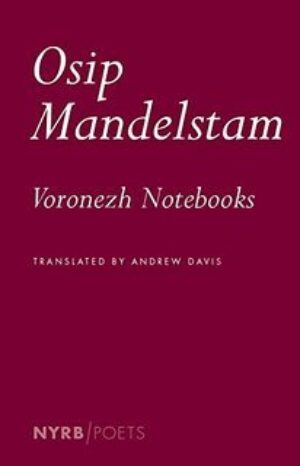In Their Own Words
Andrew Davis on Osip Mandelstam’s “Voronezh Notebooks”
59
Breaks in round bays, and shingle, and blue,
And a slow sail continued by a cloud—
I hardly knew you; I've been torn from you:
Longer than organ fugues—the sea's bitter grasses,
Fake tresses—and their long lie stinks,
My head swims with iron tenderness,
The rust gnaws bit by bit the sloping bank...
On what new sands does my head sink?
You, guttural Urals, broad-shouldered Volga lands,
Or this dead-flat plain—here are all my rights,
And, full-lunged, gotta go on breathing them.
February 4, 1937
Translated by Andrew Davis.
All rights reserved. Reprinted with the permission of the translator.
On Osip Mandelstam’s “Voronezh Notebooks”
This section is the turning point of Osip Mandelstam's long poem Voronezh Notebooks, the Continental Divide from which the waters of the poem descend, imperceptibly at first, but ineluctably, in opposed directions. On the one side a reflexive, desperate assertion of his old prerogatives as a poet, now impossible; on the other a sort of acceptance, and an eerie contemplation of the future.
It is also, in Russian, a marvelous example of what makes Russian poetry different from English poetry, of what makes Mandelstam so extraordinary as a poet, and of what makes him so miserable to translate.
But how to make this clear to someone who does not read Russian?
Here is an attempt. What follows is a rough, a very approximate phonetic transcription (system my own) of the section above, with a literal interlinear translation. Also marked are the stressed syllables (every Russian word of more that one syllable has one and only one syllable that is stressed—there is no secondary accentuation as in English.) I have not included a key to pronunciation so as not to fall prey to the temptations of accuracy. For our purposes, a general consistency is sufficient. Well, one necessary point. Paired vowels are pronounced, not as diphthongs, but as separate syllables. An unaccented "y", however, when it follows another vowel, is pronounced with that vowel, something like the "y" in "day."
59
Razrívi krúglih buht, y hrasch, y cynevá,
Gaps of round bays, and shingle, and blue,
Y párus médlenniy, chto óblakem pradólzhen—
And a sail slow, which by a cloud has been continued—
Ja svámy razluchón, vas atsenýv jedvá:
I from you have been separated, you [object] having assessed scarcely:
Dlynnéy argánnih fug—garká maréy travá,
Longer than organ fugues—bitter of the sea grass,
Lezhnevalósaja—y páhnet dólgay lózhju,
False haired—and it stinks of a long lie,
Zheléznoy nézhnostju hmeléjet gelavá,
With iron tenderness gets drunk my head [subject],
Y rzhávchyna chut-chut atlógyy béreg glózhet...
And rust bit by bit the sloping bank gnaws...
Chto zh mne pod gólavu drugóy pesók padlózhen?
What to me under the head other sands have been placed?
Ti, gerlavóy Urál, plechýstoje Pavólzhe,
You, throaty Urals, wide-shouldered Volga-lands,
Yl étot róvniy kray—vot vse maý pravá,
Or this level plain—here (are) all my rights,
Y pólnoy grúdju ih vdihát jeschó ja dólzhen.
And full-chested them to breathe still I must.
You will have to take my word that this section generally falls into the pattern of iambic hexameter. But the Russian resists it, the Russian proscription of secondary accentuation most especially resists it, dactyls like "óblakem" resist it, and long waterfalls of vowels and consonants like "lezhnevalósaja." And Mandelstam himself resists it. At crucial moments in the poem, most powerfully and appropriately in the last line, descriptive, meditative iambs become pounding, hieratic trochees.
The iambic hexameter is there, but always subverted by the natural cadence of Russian speech, and of the emotion of the poem. In the Mandelstam of the Voronezh Notebooks, meters work through the poetry like storm waves trapped in a bay: always moving, amplified and canceled, disappearing and reasserting themselves in the vivid flux of the language.
Even more remarkable in this section is the progression of the rhymes—and the concept "rhyme" is hardly inclusive enough to cover the breadth of Mandelstam's practice. Here is where the transcription above may be of some use. Mandelstam ends the last two lines of the poem with the two key words, "pravá" in the next to the last, his "rights," and "dólzhen" in the last, the "I must," the duty to go on. As is appropriate to the relatively bloodless, formal concept of "rights," the word "pravá" is anticipated with a series of conventional rhymes: "cynevá"/ "jedvá"/"travá"/"gelavá," and through these rhymes the reader is brought directly to the final conclusion in "pravá." But "dólzhen" is anticipated obliquely, first secretly suggested, subsumed in another word, then assembled bit by bit—almost like trial and error, or in an "apart from me this cup" avoidance of the inevitable—from its constituent parts: first "pradólzhen," then "lezhnevalósaja," "dólgay," "lózhju," "glózhet," "padlózhen," "Pavólzhe." (This is without even mentioning the consonant sound "zha" which works its way in a parallel fashion though the entire poem.) Finally, the word itself can't be resisted. It arrives: " dólzhen," with all the force of its pathos, inevitability and necessity.
This is Mandelstam's great gift: through a kind of synesthesia, a freak of consciousness heightened by a cultural linguistic predisposition, Mandelstam heard sense in rhyme and cadence. Sound is absorbed, and honored, as an essential vehicle of meaning, or better, as meaning itself.
How, then, to respond as a translator? To imitate the structure of the poetry would be to violate the essential principle of Mandelstam's prosody, which is the organic, indivisible relationship of sound and meaning. The only possible course is to obey that principle, to reimagine the poem, in a way re-hear it, in one's own language and in one's own time. Is it then so strange that the gorgeous pyrotechnics of Mandelstam's response in Russian should become, in contemporary English, a subdued, a dogged muttering?



